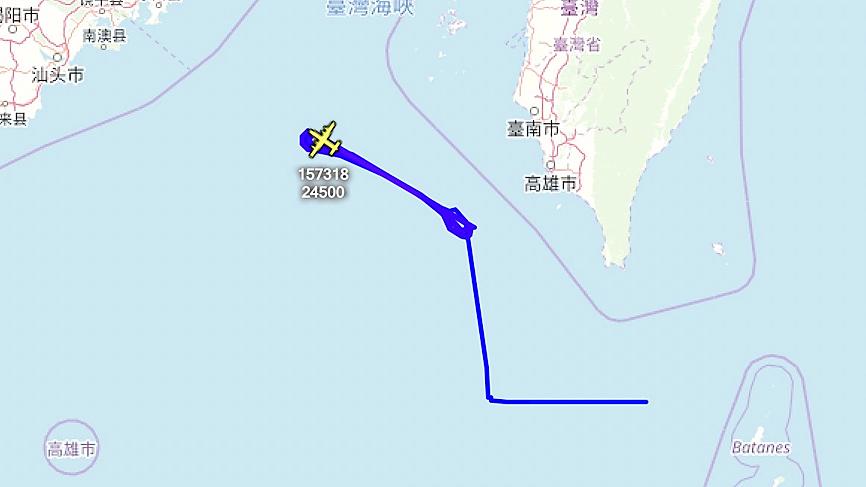A Twitter account that tracks military aircraft movements has indicated an increase in US military activity near Taiwan, coinciding with an increase in Chinese military activity in the area.
Planes from the US Seventh Fleet have been sighted frequently above the South China Sea in the past several days, and a US Navy EP-3 reconnaissance plane was seen flying close to Taiwanese airspace southwest of Kaohsiung yesterday, according to posts by the Twitter account Aircraft Spots.
The EP-3 was seen circling above the same area, Aircraft Spots said, adding that other planes from the fleet were seen in the past few days near the Philippines, where they appeared to be gathering information on Chinese vessels in the area.

Image from the Aircaft Spots Twitter account
The Ministry of National Defense said that its surveillance network is capable of monitoring the seas near Taiwan and that it always monitors the movements of aircraft and vessels near the nation’s territory.
Aircraft from the Chinese People’s Liberation Army Air Force have been spotted near Taiwan on four occasions in the past six weeks — Feb. 9, 10 and 28, and March 16.
The most recent sighting was the first time a Chinese military aircraft had approached Taiwan at night during a drill.
Following the Chinese drills on Feb. 10, a US MC-130J Commando II transport aircraft and two B-52 bombers flew over waters west and east of Taiwan.
The US last month also flew P-3 Orion maritime surveillance aircraft over waters south of Taiwan, and on Feb. 16 sailed a warship through the Taiwan Strait.

The Central Election Commission has amended election and recall regulations to require elected office candidates to provide proof that they have no Chinese citizenship, a Cabinet report said. The commission on Oct. 29 last year revised the Measures for the Permission of Family-based Residence, Long-term Residence and Settlement of People from the Mainland Area in the Taiwan Area (大陸地區人民在台灣地區依親居留長期居留或定居許可辦法), the Executive Yuan said in a report it submitted to the legislature for review. The revision requires Chinese citizens applying for permanent residency to submit notarial documents showing that they have lost their Chinese household record and have renounced — or have never

A magnitude 5.6 earthquake struck off the coast of Yilan County at 12:37pm today, with clear shaking felt across much of northern Taiwan. There were no immediate reports of damage. The epicenter of the quake was 16.9km east-southeast of Yilan County Hall offshore at a depth of 66.8km, Central Weather Administration (CWA) data showed. The maximum intensity registered at a 4 in Yilan County’s Nanao Township (南澳) on Taiwan’s seven-tier scale. Other parts of Yilan, as well as certain areas of Hualien County, Taipei, New Taipei City, Taoyuan, Hsinchu County, Taichung and Miaoli County, recorded intensities of 3. Residents of Yilan County and Taipei received

Taiwan has secured another breakthrough in fruit exports, with jujubes, dragon fruit and lychees approved for shipment to the EU, the Ministry of Agriculture said yesterday. The Animal and Plant Health Inspection Agency on Thursday received formal notification of the approval from the EU, the ministry said, adding that the decision was expected to expand Taiwanese fruit producers’ access to high-end European markets. Taiwan exported 126 tonnes of lychees last year, valued at US$1.48 million, with Japan accounting for 102 tonnes. Other export destinations included New Zealand, Hong Kong, the US and Australia, ministry data showed. Jujube exports totaled 103 tonnes, valued at

BIG SPENDERS: Foreign investors bought the most Taiwan equities since 2005, signaling confidence that an AI boom would continue to benefit chipmakers Taiwan Semiconductor Manufacturing Co’s (TSMC, 台積電) market capitalization swelled to US$2 trillion for the first time following a 4.25 percent rally in its American depositary receipts (ADR) overnight, putting the world’s biggest contract chipmaker sixth on the list of the world’s biggest companies by market capitalization, just behind Amazon.com Inc. The site CompaniesMarketcap.com ranked TSMC ahead of Saudi Aramco and Meta Platforms Inc. The Taiwanese company’s ADRs on Tuesday surged to US$385.75 on the New York Stock Exchange, as strong demand for artificial intelligence (AI) applications led to chip supply constraints and boost revenue growth to record-breaking levels. Each TSMC ADR represents